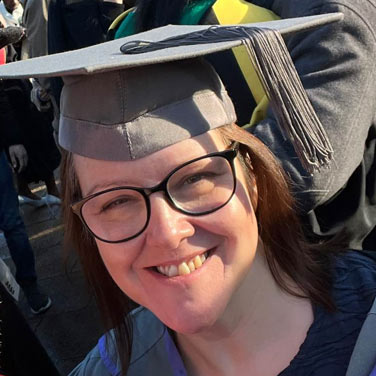Susie Taylor, Senior Project Manager

Qu 1. What is it like “coming out” as an LGBT person?
My “coming out” journey has spanned over 3 decades with different challenges and phases. As a bisexual, it’s easy for people to assume that I’m straight if in a relationship with a member of the opposite sex. It’s then a conversation with each person or group to explain that I am proudly and very definitely bisexual.
In my late teens I joined the Royal Air Force when members of the LGBTQ+ community were banned from being part of our UK military services. If found to be LGBTQ+, you could be sent to military prison or immediately sacked. I lived in dread of this and it caused a great deal of stress and prevented me from being my whole self at work and with my fellow RAF family. Thankfully the ban was lifted in 2000 and our Armed Forces has changed greatly in Equality and Diversity matters.
When I started my Higher Education career in 2010, I felt that I had found my people. Universities provide a wide mix of people and backgrounds, and it’s sometimes easier to find your tribe. However, there is still work to do in embedding equality and diversity across the university and sector.
Qu 2. What can we all do to make Keele a better place for LGBT staff and students?
Having visible, out and proud LGBTQ+ staff role models who are willing to share their stories, is a powerful way of showing Keele’s supportive environment. Having contact details of both these role models and staff groups, provides a way for those staff who may be hesitant in being out at work to reach out to others.
Be an Ally, be supportive of LGBT matters, and call out or challenge unacceptable behaviour or language. This may be in general conversation with your or other teams around Keele. This is equally important whether someone in the conversation is LGBT or not. Make it clear that this not acceptable.
HR provide training on both being an Ally and how to have difficult conversations.
Qu 3. What advice would you give to other LGBT staff or students who may be facing difficulties as a result of their sexuality?
I would say that you are not alone, and there is great help and support at the University, reach out to the University groups (either staff or student) available to you. These groups may help you “find your clan”, provide a friendly and supportive ear, or guide you in accessing other services if the matter is more serious.
Qu 4. What is your experience of being LGBT with other protected characteristics?
I was born in Northern Ireland in a presbyterian family in the times of the troubles, where being LGBT was not supported. I always felt different and when we moved to England, felt even more so, due to my Northern Irish accent. I soon developed an impressive Stoke accent (with potteries slang) but still felt like an outsider. When I started my University studies as a mature student, I discovered that I am dyslexic. Although this has its challenges, I have found that it also has its benefits in the way I think and see the world, and I use this to its full advantage in my role as Senior Project Manager. Due to my disability, I am passionate about assistive technology which provides tools that remove barriers for staff and students to enable them to reach their full potential.
I work in a male dominated profession (I.T.), luckily at Keele, IT are looking to diversify their staff in many ways, and I am happy to be part of that work.



